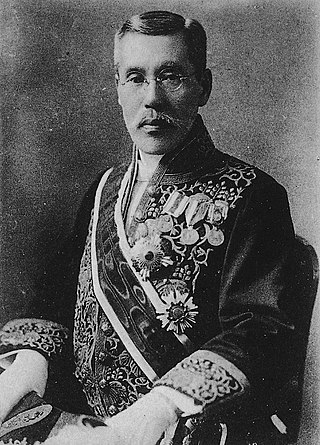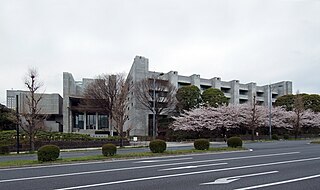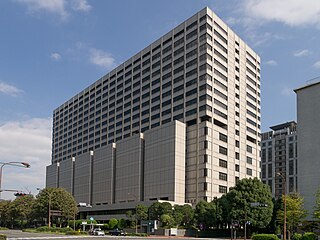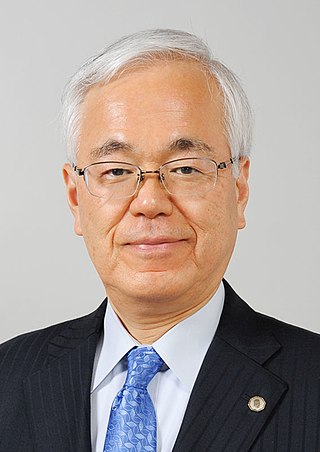Related Research Articles

A judge is a person who presides over court proceedings, either alone or as a part of a panel of judges. A judge hears all the witnesses and any other evidence presented by the barristers or solicitors of the case, assesses the credibility and arguments of the parties, and then issues a ruling in the case based on their interpretation of the law and their own personal judgment. A judge is expected to conduct the trial impartially and, typically, in an open court.

Kiichirō Hiranuma was a prominent right-wing Japanese politician and Prime Minister of Japan in 1939. He was convicted of war crimes committed during World War II and was sentenced to life imprisonment.

The Supreme Court of Japan, located in Hayabusachō, Chiyoda, Tokyo, is the highest court in Japan. It has ultimate judicial authority to interpret the Japanese constitution and decide questions of national law. It has the power of judicial review, which allows it to determine the constitutionality of any law or official act.

In the judicial system of Japan, the Constitution of Japan guarantees that "all judges shall be independent in the exercise of their conscience and shall be bound only by this constitution and the Laws". They cannot be removed from the bench "unless judicially declared mentally or physically incompetent to perform official duties", and they cannot be disciplined by executive agencies. Supreme Court judges, however, may be removed by a majority of voters in a referendum that occurs at the first general election following the judge's appointment and every ten years thereafter. The judiciary was far more constrained under the Meiji Constitution than it is under the present Constitution and had no authority over administrative or constitutional law cases. Moreover, the Ministry of Justice had complete and direct control over the courts' administrative affairs. Nonetheless, Professor John Haley argues that the courts maintained complete independence in the adjudication of particular cases. "Judicial independence from the political branches was emphatically established as a fundamental principle of governance in Article 57 of the Meiji Constitution. Of all branches of government only the courts exercised authority 'in the name of the Emperor'." Haley argues that this was and remains a matter of great pride for Japanese judges and notes that "placed prominently in all courtrooms was the inscription 'in the name of the Emperor' as a meaningful reminder to imperial officials and subjects alike that the Emperor's judges were not subject to political control or direction."
Akira Machida was Chief Justice of the Supreme Court of Japan from 2002 to 2006.
Niro Shimada was the Chief Justice of the Supreme Court of Japan.

Wilhelmina Marie Wright is a United States district judge of the United States District Court for the District of Minnesota. She is the only jurist in Minnesota's history to be state district court judge, appellate court judge and state supreme court justice. She was formerly an associate justice of the Minnesota Supreme Court, a judge of the Minnesota Court of Appeals, and a judge of the Minnesota District Court, Second Judicial District.
Itsurō Terada is a Japanese lawyer who served as the 18th Chief Justice of the Supreme Court of Japan.
Jon J. Jensen is an American lawyer and judge, who is the chief justice of the North Dakota Supreme Court. He previously served as a district court judge in North Dakota from 2013 to 2017.

Naoto Ōtani is a Japanese jurist and lawyer who served as the 19th Chief Justice of the Supreme Court of Japan from 2018 to 2022.
The Solano County Superior Court is the California superior court with jurisdiction over Solano County.
Katsuya Uga is a Japanese jurist who has served as an associate justice of the Supreme Court of Japan since 2019.

Saburo Tokura is a Japanese jurist who has served as the Chief Justice of Japan since June 2022, having previously served as an Associate Justice on the Supreme Court of Japan from 2017 to 2022.
Katsuyuki Kizawa is a Japanese jurist who served as an associate Justice of the Supreme Court of Japan from 2016 to 2021.
Michiharu Hayashi is a Japanese jurist who has served as an associate Justice of the Supreme Court of Japan since 2019.
Masayuki Ikegami is a Japanese jurist who served as an associate Justice of the Supreme Court of Japan from 2014 to 2021.
Ryosuke Yasunami is a Japanese jurist who has served as an associate Justice of the Supreme Court of Japan since 2021.
Elizabeth Gwaunza is a Zimbabwean lawyer and jurist who has been Deputy Chief Justice of the Supreme Court of Zimbabwe since March 2018.
References
- 1 2 "KANNO Hiroyuki | 裁判所 - Courts in Japan". Courts in Japan. Archived from the original on 2022-01-17. Retrieved 2021-06-02.
- 1 2 "Supreme Court of Japan | Japanese government". Encyclopedia Britannica. Retrieved 2021-06-02.